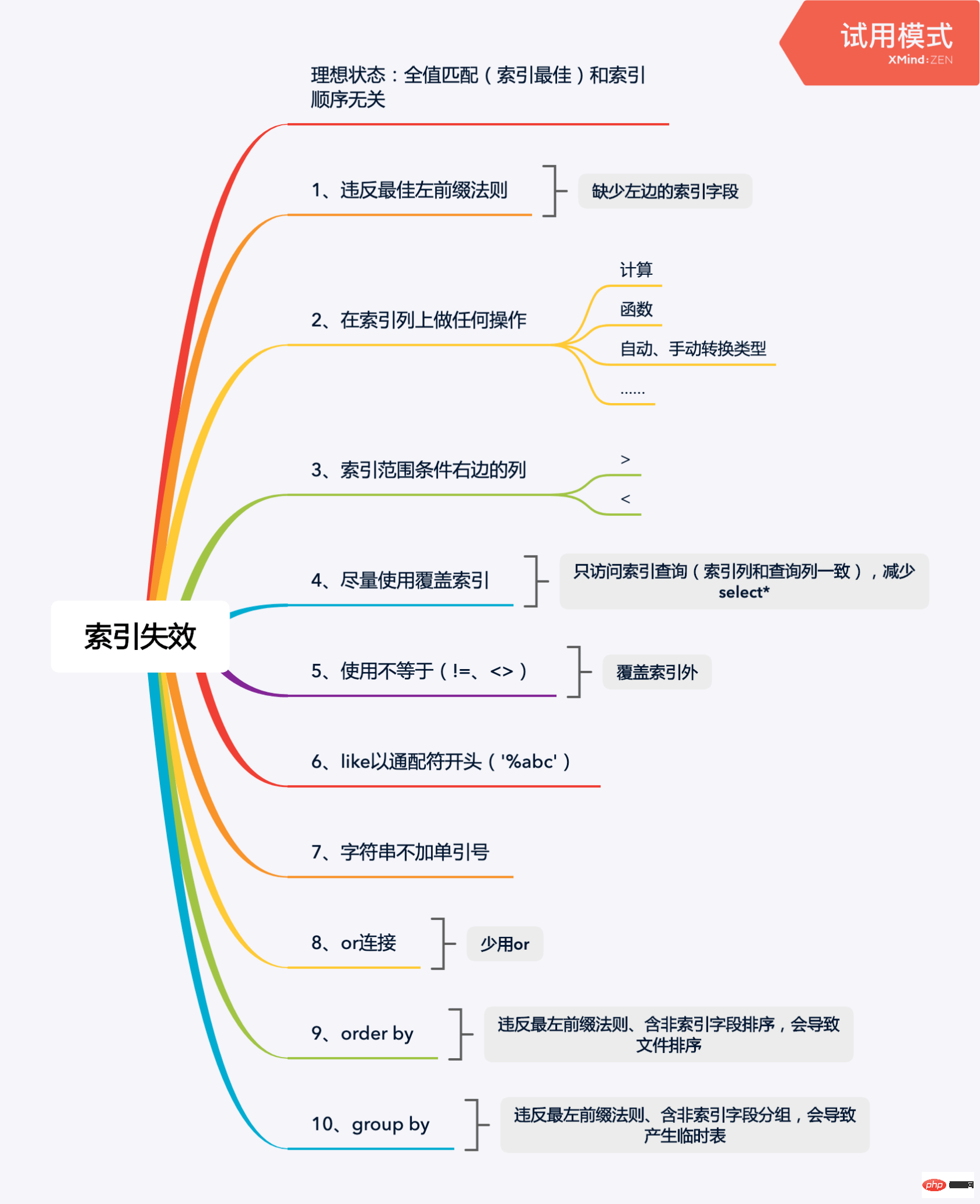explain select * from user where name = 2000;
Introducing the situation of mysql index failure
# mysql video tutorial column index expires.

#Indices are a very important chapter for MySQL. There are also a lot of index knowledge points. If you want to master them thoroughly, you need to break down each knowledge point one by one. Today, let’s first talk about the situations that will cause index failure.
Picture summary version

Related free learning recommendations: mysql video tutorial
Full value matching (best index)
explain select * from user where name = 'zhangsan' and age = 20 and pos = 'cxy' and phone = '18730658760';

和索引顺序无关,MySQL底层的优化器会进行优化,调整索引的顺序 explain select * from user where name = 'zhangsan' and age = 20 and pos = 'cxy' and phone = '18730658760';

如果索引有多列,要遵守最左前缀法则
即查询从索引的最左前列开始并且不跳过索引中的列
explain select * from user where age = 20 and phone = '18730658760' and pos = 'cxy';
Copy after login
如果索引有多列,要遵守最左前缀法则 即查询从索引的最左前列开始并且不跳过索引中的列 explain select * from user where age = 20 and phone = '18730658760' and pos = 'cxy';

如计算、函数、(自动or手动)类型转换等操作,会导致索引失效从而全表扫描
explain select * from user where left(name,5) = 'zhangsan' and age = 20 and phone = '18730658760';
Copy after login
如计算、函数、(自动or手动)类型转换等操作,会导致索引失效从而全表扫描 explain select * from user where left(name,5) = 'zhangsan' and age = 20 and phone = '18730658760';

索引范围条件右边的索引列会失效
explain select * from user where name = 'zhangsan' and age > 20 and pos = 'cxy';
Copy after login
索引范围条件右边的索引列会失效 explain select * from user where name = 'zhangsan' and age > 20 and pos = 'cxy';

只访问索引查询(索引列和查询列一致),减少select*
explain select name,age,pos,phone from user where age = 20;
Copy after login
只访问索引查询(索引列和查询列一致),减少select* explain select name,age,pos,phone from user where age = 20;

mysql在使用不等于(!=、)的时候无法使用索引会导致全表扫描(除覆盖索引外)
explain select * from user where age != 20;
explain select * from user where age 20;
Copy after login
mysql在使用不等于(!=、)的时候无法使用索引会导致全表扫描(除覆盖索引外) explain select * from user where age != 20; explain select * from user where age 20;


索引失效
explain select * from user where name like '%zhangsan';
Copy after login
索引失效 explain select * from user where name like '%zhangsan';

索引生效 explain select * from user where name like 'zhangsan%';

explain select * from user where name = 2000;
Copy after login
explain select * from user where name = 2000;

少用or
explain select * from user where name = '2000' or age = 20 or pos ='cxy';
Copy after login
少用or explain select * from user where name = '2000' or age = 20 or pos ='cxy';

正常(索引参与了排序)
explain select * from user where name = 'zhangsan' and age = 20 order by age,pos;
备注:索引有两个作用:排序和查找
Copy after login
导致额外的文件排序(会降低性能)
explain select name,age from user where name = 'zhangsan' order by pos;//违反最左前缀法则
explain select name,age from user where name = 'zhangsan' order by pos,age;//违反最左前缀法则
explain select * from user where name = 'zhangsan' and age = 20 order by created_time,age;//含非索引字段
Copy after login
正常(索引参与了排序) explain select * from user where name = 'zhangsan' and age = 20 order by age,pos; 备注:索引有两个作用:排序和查找
导致额外的文件排序(会降低性能) explain select name,age from user where name = 'zhangsan' order by pos;//违反最左前缀法则 explain select name,age from user where name = 'zhangsan' order by pos,age;//违反最左前缀法则 explain select * from user where name = 'zhangsan' and age = 20 order by created_time,age;//含非索引字段


 ##10、group by
##10、group by
正常(索引参与了排序) explain select name,age from user where name = 'zhangsan' group by age; 备注:分组之前必排序(排序同order by)
导致产生临时表(会降低性能) explain select name,pos from user where name = 'zhangsan' group by pos;//违反最左前缀法则 explain select name,age from user where name = 'zhangsan' group by pos,age;//违反最左前缀法则 explain select name,age from user where name = 'zhangsan' group by age,created_time;//含非索引字段



##Sample data used
mysql> show create table user \G ****************************************************** Table: user Create Table: CREATE TABLE `user` ( `id` int(10) NOT NULL AUTO_INCREMENT, `name` varchar(20) DEFAULT NULL, `age` int(10) DEFAULT '0', `pos` varchar(30) DEFAULT NULL, `phone` varchar(11) DEFAULT NULL, `created_time` datetime DEFAULT NULL, PRIMARY KEY (`id`), KEY `idx_name_age_pos_phone` (`name`,`age`,`pos`,`phone`) ) ENGINE=InnoDB DEFAULT CHARSET=utf8mb4 COLLATE=utf8mb4_0900_ai_ci
The above is the detailed content of Introducing the situation of mysql index failure. For more information, please follow other related articles on the PHP Chinese website!

Hot AI Tools

Undresser.AI Undress
AI-powered app for creating realistic nude photos

AI Clothes Remover
Online AI tool for removing clothes from photos.

Undress AI Tool
Undress images for free

Clothoff.io
AI clothes remover

Video Face Swap
Swap faces in any video effortlessly with our completely free AI face swap tool!

Hot Article

Hot Tools

Notepad++7.3.1
Easy-to-use and free code editor

SublimeText3 Chinese version
Chinese version, very easy to use

Zend Studio 13.0.1
Powerful PHP integrated development environment

Dreamweaver CS6
Visual web development tools

SublimeText3 Mac version
God-level code editing software (SublimeText3)

Hot Topics
 1387
1387
 52
52
 How to open phpmyadmin
Apr 10, 2025 pm 10:51 PM
How to open phpmyadmin
Apr 10, 2025 pm 10:51 PM
You can open phpMyAdmin through the following steps: 1. Log in to the website control panel; 2. Find and click the phpMyAdmin icon; 3. Enter MySQL credentials; 4. Click "Login".
 MySQL: An Introduction to the World's Most Popular Database
Apr 12, 2025 am 12:18 AM
MySQL: An Introduction to the World's Most Popular Database
Apr 12, 2025 am 12:18 AM
MySQL is an open source relational database management system, mainly used to store and retrieve data quickly and reliably. Its working principle includes client requests, query resolution, execution of queries and return results. Examples of usage include creating tables, inserting and querying data, and advanced features such as JOIN operations. Common errors involve SQL syntax, data types, and permissions, and optimization suggestions include the use of indexes, optimized queries, and partitioning of tables.
 How to use single threaded redis
Apr 10, 2025 pm 07:12 PM
How to use single threaded redis
Apr 10, 2025 pm 07:12 PM
Redis uses a single threaded architecture to provide high performance, simplicity, and consistency. It utilizes I/O multiplexing, event loops, non-blocking I/O, and shared memory to improve concurrency, but with limitations of concurrency limitations, single point of failure, and unsuitable for write-intensive workloads.
 MySQL's Place: Databases and Programming
Apr 13, 2025 am 12:18 AM
MySQL's Place: Databases and Programming
Apr 13, 2025 am 12:18 AM
MySQL's position in databases and programming is very important. It is an open source relational database management system that is widely used in various application scenarios. 1) MySQL provides efficient data storage, organization and retrieval functions, supporting Web, mobile and enterprise-level systems. 2) It uses a client-server architecture, supports multiple storage engines and index optimization. 3) Basic usages include creating tables and inserting data, and advanced usages involve multi-table JOINs and complex queries. 4) Frequently asked questions such as SQL syntax errors and performance issues can be debugged through the EXPLAIN command and slow query log. 5) Performance optimization methods include rational use of indexes, optimized query and use of caches. Best practices include using transactions and PreparedStatemen
 Why Use MySQL? Benefits and Advantages
Apr 12, 2025 am 12:17 AM
Why Use MySQL? Benefits and Advantages
Apr 12, 2025 am 12:17 AM
MySQL is chosen for its performance, reliability, ease of use, and community support. 1.MySQL provides efficient data storage and retrieval functions, supporting multiple data types and advanced query operations. 2. Adopt client-server architecture and multiple storage engines to support transaction and query optimization. 3. Easy to use, supports a variety of operating systems and programming languages. 4. Have strong community support and provide rich resources and solutions.
 Monitor Redis Droplet with Redis Exporter Service
Apr 10, 2025 pm 01:36 PM
Monitor Redis Droplet with Redis Exporter Service
Apr 10, 2025 pm 01:36 PM
Effective monitoring of Redis databases is critical to maintaining optimal performance, identifying potential bottlenecks, and ensuring overall system reliability. Redis Exporter Service is a powerful utility designed to monitor Redis databases using Prometheus. This tutorial will guide you through the complete setup and configuration of Redis Exporter Service, ensuring you seamlessly build monitoring solutions. By studying this tutorial, you will achieve fully operational monitoring settings
 How to view sql database error
Apr 10, 2025 pm 12:09 PM
How to view sql database error
Apr 10, 2025 pm 12:09 PM
The methods for viewing SQL database errors are: 1. View error messages directly; 2. Use SHOW ERRORS and SHOW WARNINGS commands; 3. Access the error log; 4. Use error codes to find the cause of the error; 5. Check the database connection and query syntax; 6. Use debugging tools.
 How to connect to the database of apache
Apr 13, 2025 pm 01:03 PM
How to connect to the database of apache
Apr 13, 2025 pm 01:03 PM
Apache connects to a database requires the following steps: Install the database driver. Configure the web.xml file to create a connection pool. Create a JDBC data source and specify the connection settings. Use the JDBC API to access the database from Java code, including getting connections, creating statements, binding parameters, executing queries or updates, and processing results.




